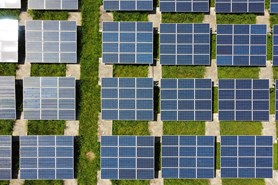Gleeds has been appointed as delivery partner for the Department for Education’s (DfE) Net Zero Accelerator programme by specialist government-owned consultancy LocatED. In partnership with eEnergy and PureThermal, Gleeds will undertake a feasibility study focusing on ten schools from across England to explore the commercial viability of a range of decarbonisation interventions.
The Net Zero Accelerator scheme aims to create a ‘one-stop shop’ to fund and deliver decarbonisation initiatives across the education estate through a new national service. This will provide responsible bodies, such as local authorities and multi-academy trusts, with a low burden service to address building condition and energy efficiency to help improve their estate including the delivery of decarbonisation interventions.
The programme will also seek to reduce risk, as well as the time and resource required for decarbonisation. This will be achieved by requiring no upfront payment; through sharing the risk of delivery with external market partners; and arranging the intervention work and funding for them.
Commissioned by the DfE to create and run the programme, LocatED launched the Net Zero Accelerator in August with a market engagement session attracting over 270 participants. Five partners have now been selected to develop proposals for ten schools selected from a batch of 50, which have been chosen based on criteria including potential carbon savings, capital/ROI and operational impact.
Dave Wakelin, director of sustainability at Gleeds said, “This project represents a step change in how the public sector delivers its net zero obligations, so I’m excited that Gleeds – along with eEnergy and PureThermal - have been selected by LocatED as a partner. The huge oversubscription for grant schemes like the Public Sector Decarbonisation Scheme shows the strong demand across the public sector for funding to deliver decarbonisation. Our consortium is incredibly proud to be working to develop solutions that bridge the funding gap and bring together private and public sectors to deliver decarbonisation on a massive and sustainable scale.”
The feasibility studies began earlier this week and are due to conclude by the end of the year. The studies will demonstrate the range of potential decarbonisation interventions that could be delivered as part of the Net Zero Accelerator; the associated reduction in carbon produced and energy consumed; the cost of delivery; and the income generation based on existing school data such as energy consumption, condition data, asset registers and building surveys. It will also explore how a positive return on investment (ROI) can be generated so that a commercially viable programme of work can be rolled out at pace.
Commenting on the launch of the Net Zero Accelerator feasibility studies, LocatED Chief Executive Lara Newman added, “We are passionate about helping the DfE and, indeed, the whole country to achieve Net Zero. The education estate represents 37% of all public sector building emissions. If schools and colleges are able to reduce their carbon footprint and achieve net zero, this will go a long way to meeting the government’s goal.”
“However, we recognise that for individual educational bodies, figuring out the right thing to do for their estate is incredibly difficult to do alone. Deciding whether to opt for air source heat pumps and solar panels or installing an electric vehicle charging station and added insulation is not an easy choice. This is why the Net Zero Accelerator is intended to lift the burden from the educational bodies of identifying what interventions will work for their buildings and how the work will be financed,” she went on to say.
Harvey Sinclair, Group CEO of eEnergy, remarked, “It’s a staggering fact that public and private sector buildings squander up to 30% of their energy. At eEnergy, we see this not as a mere statistic, but as a phenomenal opportunity to drive down both costs and carbon footprints. We are on a mission to eliminate this waste, transforming Net Zero from a concept to a cost-saving reality. Our collaboration with Gleeds and PureThermal under the DfE Net Zero Accelerator programme leverages our track record of over a thousand energy efficiency projects. With our distinctive capability to verify energy savings, we're empowering organisations to make informed decisions, accelerating their journey towards Net Zero while bolstering their bottom line.”
Reports are expected to be presented by the end of February 2024, with results informing the viability of a trial roll out next Spring.

Dave Wakelin
Director of Sustainability
- dave.wakelin@gleeds.com
- +44 (0) 7443 071 021



